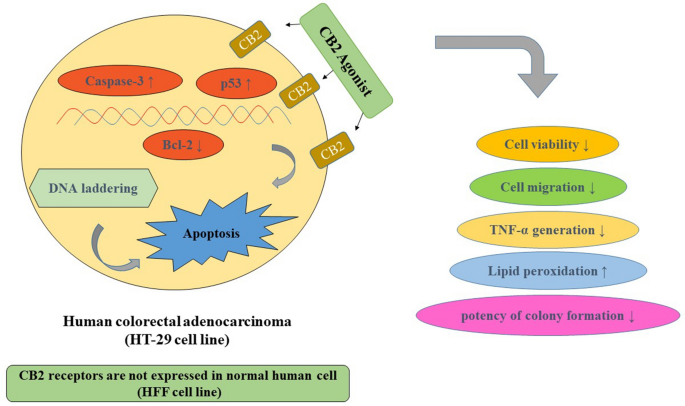 “Colorectal cancer (CRC) is between the top three occurring cancers worldwide. The anticancer effects of Cannabinoid receptor 2 (CB2) agonist (GW833972A) in the presence and absence of its inverse agonist (SR144528) on Human colorectal adenocarcinoma cells (HT-29) was investigated. Following cell viability assays on HT-29 and HFF cells, the molecular mechanism(s) of cytotoxicity and apoptotic pathways of cell death were analyzed. The anticancer effects of CB2 agonist were measured with tumor cell migration and colony-forming assays. Real-time PCR and Western blotting techniques were used to examine any alterations in the expression of apoptotic genes. A concentration and time-dependent cytotoxicity of CB2 agonist with IC50 value of 24.92 ± 6.99 μM was obtained. The rate of lipid peroxidation was elevated, while the TNF-α concentration was declined, significantly (p < 0.05). CB2 agonist (50 μM) reduced the colony-forming capability by 83% and tumor cell migration by 50%. Apoptotic effects of CB2 agonist were revealed with the increase of apoptotic cells in Acridine orange/Ethidium bromide staining, clear DNA fragmentation, pro-apoptotic genes and proteins upregulation (Caspase-3 and p53), and significant downregulation of anti-apoptotic Bcl-2. All assessments demonstrated that CB2 agonist-induced effects were reversed by CB2 inverse agonist. These data suggest that CB2 agonists at micro-molar concentrations might be considered in the CRC treatment, and their effectiveness attributes to the apoptosis induction via upregulation of caspase-3 and p53 and downregulation of Bcl-2.”
“Colorectal cancer (CRC) is between the top three occurring cancers worldwide. The anticancer effects of Cannabinoid receptor 2 (CB2) agonist (GW833972A) in the presence and absence of its inverse agonist (SR144528) on Human colorectal adenocarcinoma cells (HT-29) was investigated. Following cell viability assays on HT-29 and HFF cells, the molecular mechanism(s) of cytotoxicity and apoptotic pathways of cell death were analyzed. The anticancer effects of CB2 agonist were measured with tumor cell migration and colony-forming assays. Real-time PCR and Western blotting techniques were used to examine any alterations in the expression of apoptotic genes. A concentration and time-dependent cytotoxicity of CB2 agonist with IC50 value of 24.92 ± 6.99 μM was obtained. The rate of lipid peroxidation was elevated, while the TNF-α concentration was declined, significantly (p < 0.05). CB2 agonist (50 μM) reduced the colony-forming capability by 83% and tumor cell migration by 50%. Apoptotic effects of CB2 agonist were revealed with the increase of apoptotic cells in Acridine orange/Ethidium bromide staining, clear DNA fragmentation, pro-apoptotic genes and proteins upregulation (Caspase-3 and p53), and significant downregulation of anti-apoptotic Bcl-2. All assessments demonstrated that CB2 agonist-induced effects were reversed by CB2 inverse agonist. These data suggest that CB2 agonists at micro-molar concentrations might be considered in the CRC treatment, and their effectiveness attributes to the apoptosis induction via upregulation of caspase-3 and p53 and downregulation of Bcl-2.”
https://pubmed.ncbi.nlm.nih.gov/33886060/
https://link.springer.com/article/10.1007/s11010-021-04158-6

